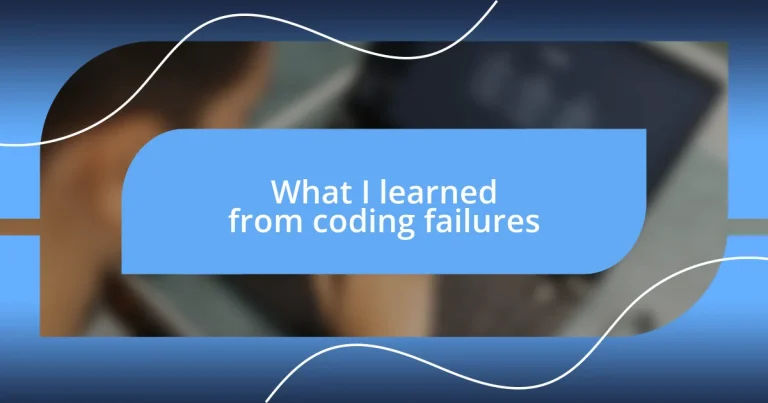Key takeaways:
- Coding failures present valuable lessons and foster growth by encouraging reflection and strategic reevaluation.
- Common mistakes like syntax errors, logic errors, and misunderstanding data types highlight the importance of attention to detail and understanding fundamentals.
- Building resilience involves embracing feedback, fostering community connections, and transforming setbacks into opportunities for improvement and learning.
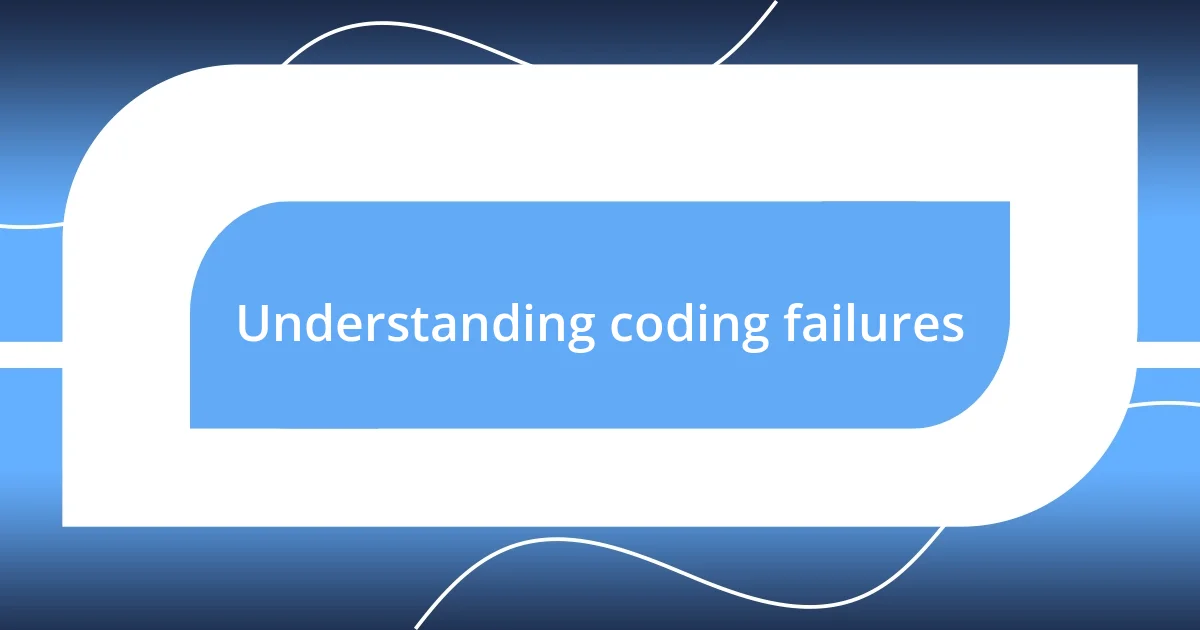
Understanding coding failures
Coding failures can often feel like a punch in the gut, and I’ve been there more times than I care to admit. I remember a project where I spent countless hours debugging, only to realize I’d overlooked a single misplaced bracket. It made me wonder: How could something so small cause such a major setback? That experience taught me that overlooking details might be my biggest weakness, but it’s also where the most significant learning happens.
When I think of coding failures, I can’t help but recall that moment of sheer frustration, staring at the screen, knowing something was wrong but not being able to pinpoint it. It’s almost maddening, right? I’ve learned that this uncertainty is a common experience for many developers. It’s essential to embrace that ambiguity because it often leads to deeper understanding and growth in the long run.
What I’ve discovered is that every coding failure holds a lesson, waiting to be untangled. I tend to ask myself, “What can this teach me?” It’s a mindset that transforms failures from burdens into stepping stones. Each error pushes us to rethink our strategies, refine our techniques, and ultimately become better coders. Isn’t that a powerful realization?
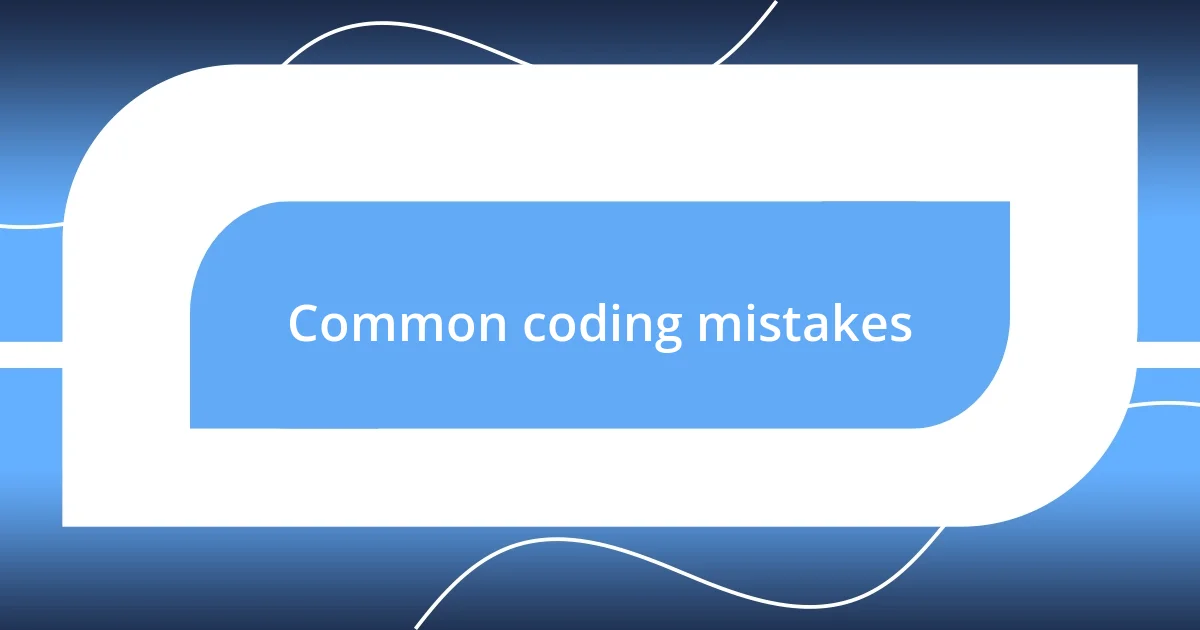
Common coding mistakes
One of the most common coding mistakes I’ve encountered is the mix-up of data types. For instance, I once attempted to perform a mathematical operation on a string instead of a number, which led to hours of confusion and frustration. It’s those moments when you realize you’ve set yourself up for failure simply by not paying attention to what type of variable you’re working with.
Here’s a quick rundown of some frequent coding mistakes I’ve seen:
- Syntax errors: Missing semicolons or brackets can ruin your day.
- Incorrect variable names: Typos or inconsistent naming patterns lead to bugs that are hard to trace.
- Logic errors: Your code runs, but it doesn’t produce the result you want—been there way too many times.
- Off-by-one errors: This nuance in loops can throw a wrench in your logic; it’s a classic mistake!
- Ignoring the importance of comments: It’s easy to forget to annotate your code, but later, you’ll find yourself lost in your own logic.
Each of these mistakes has a lesson behind it. I remember feeling that sense of panic when a program wouldn’t run as expected, only to realize it was a simple oversight. That panic is a great motivator; it pushes you to be more diligent in your approach. So, while I’ve made these mistakes, I’ve also learned that they’re part of a larger journey in becoming a proficient coder.
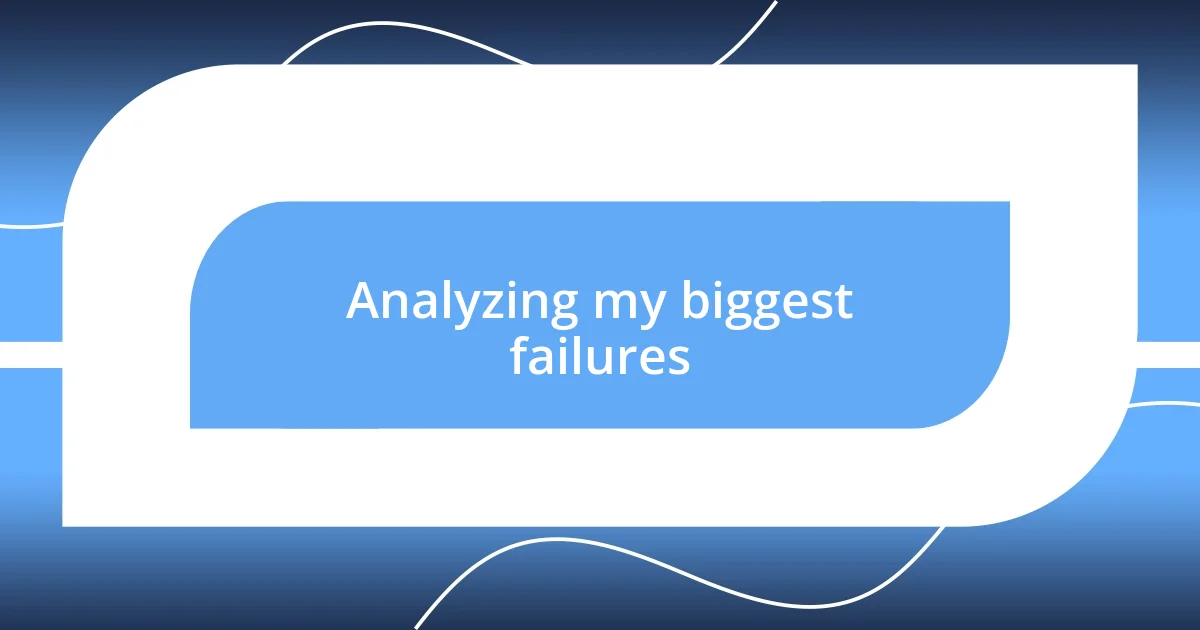
Analyzing my biggest failures
When I reflect on my biggest coding failures, one particular incident stands out: I once rushed through a project deadline and neglected thorough testing. I thought I would manage—how hard could it be? But the moment I hit “run,” I was met with a screen full of errors. It felt like a bucket of cold water splashed in my face. I learned that haste often leads to carelessness; now, I prioritize testing and review, no matter how tight the deadline seems.
Another memorable failure was when I tried to implement a complex algorithm without fully understanding its mechanics. I vividly recall feeling a mix of excitement and anxiety as I dove in. Yet, it quickly turned to despair when my code wouldn’t work, and I realized I had misconstrued the basic principles behind it. This was a humbling experience that taught me the importance of mastering the basics before attempting more advanced concepts. I now make it a point to build a solid foundation in any new technology I tackle.
To further illustrate my learning journey, I’ve compiled a comparison of these experiences and takeaways:
| Failure Type | Lesson Learned |
|---|---|
| Rushing a Project | Importance of thorough testing and review |
| Complex Algorithm | Master the basics before tackling advanced concepts |
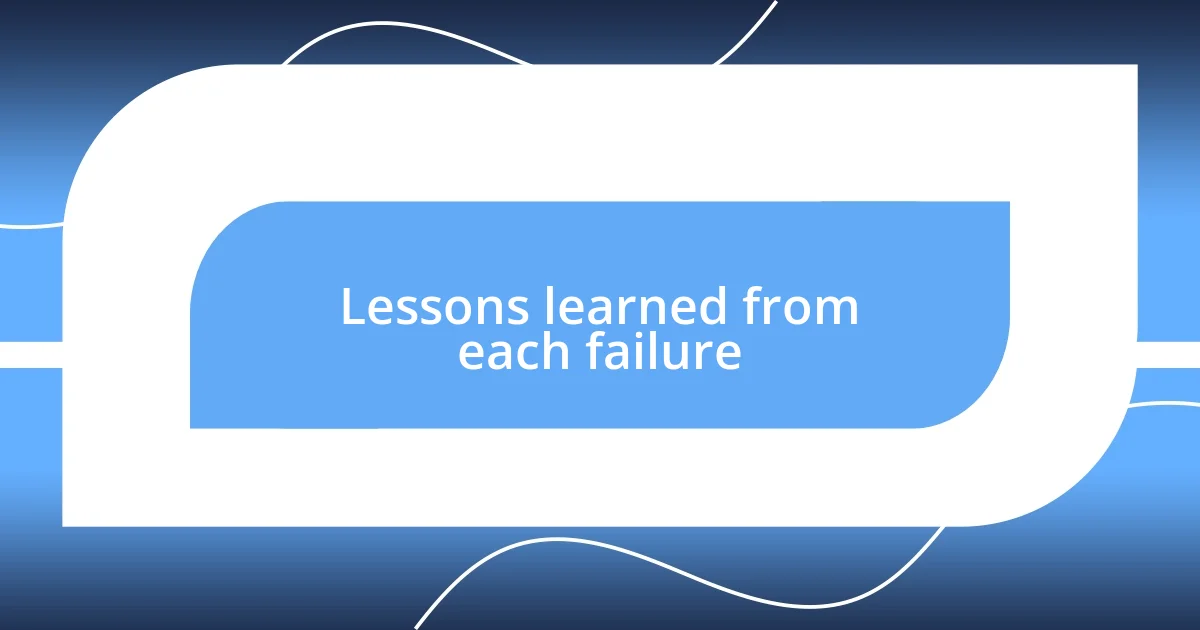
Lessons learned from each failure
Each failure in coding has left a mark, teaching me valuable lessons that I carry forward. For instance, there was a time I completely overlooked exception handling in a web app I was developing. It crumbled during user testing, leading to a cascade of errors. This misstep taught me that anticipating problems is just as crucial as writing the actual code. How often do we forget that preparation is key? Now, I embrace a proactive mindset, ensuring I account for potential roadblocks before they derail my project.
Another significant lesson emerged from an encounter with endless debugging. I could almost hear the clock ticking as I combed through lines of code that turned out to be perfect—until I realized I had forgotten to update my local environment. The frustration of wasted time was palpable! This ordeal pushed me to embrace better version control practices, like using branching strategies, which help to keep my workspace organized. Have you ever felt the sting of confusion after hours of chasing ghosts? From that experience, I learned that maintaining a clean and well-managed codebase streamlines my workflow.
There’s this one instance that still stands out vividly in my memory: I once ignored the concept of code reviews, thinking they were unnecessary fluff. When my manager pointed out glaring issues after I deployed without a second opinion, I was mortified. That embarrassment fueled a commitment to seeking feedback early and often. It’s amazing how collaboration can turn a simple error into a learning opportunity. How liberating it is to realize that sharing our work can only improve it!
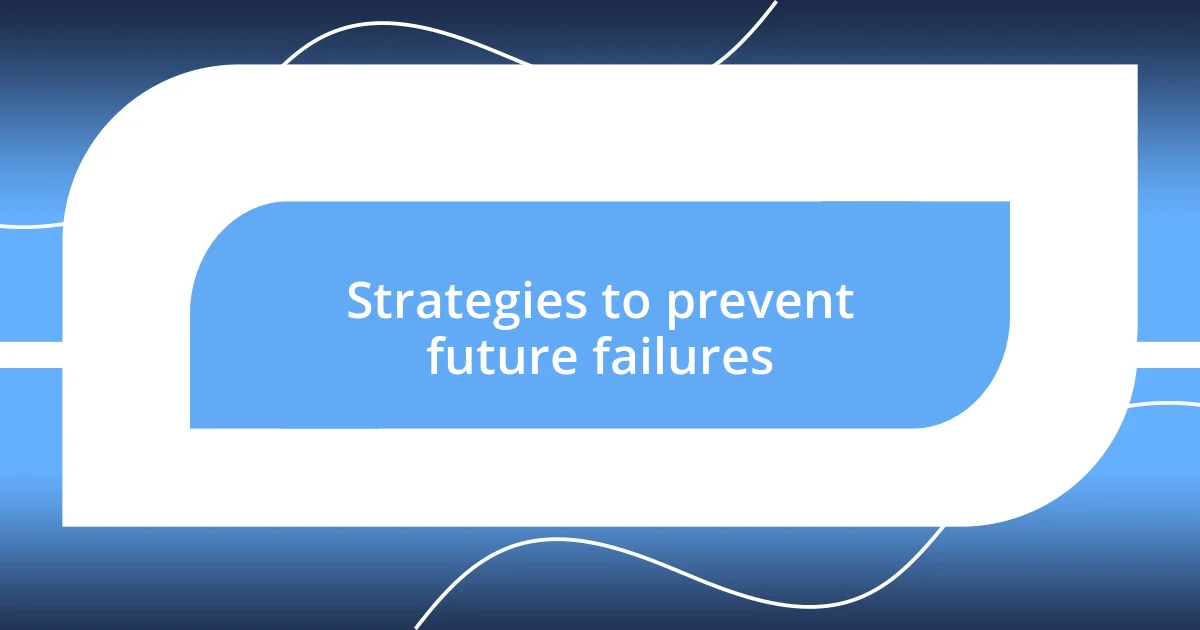
Strategies to prevent future failures
When it comes to preventing future coding failures, one strategy that has been a game changer for me is adopting a consistent coding standard. I remember the time I received feedback on my inconsistent formatting; it drove home the fact that even small details can lead to major misunderstandings in a project. In my experience, a well-defined style guide not only streamlines the coding process but also fosters better communication among team members. Have you ever struggled to decipher code that seems to have multiple authors? Simplifying this aspect can save valuable time!
Additionally, I now embrace pair programming as a regular practice. The first time I tried it, I felt hesitant, unsure if it would actually help. But as I worked alongside a colleague, bouncing ideas off each other, I quickly realized how much my code improved! Having a fresh set of eyes can help catch errors that I might have missed. Do you ever wish you had someone to troubleshoot with? Pair programming not only boosts code quality but also enhances learning and camaraderie within a team.
Lastly, I learned the importance of post-mortem analysis after a project wraps up. I vividly recall finishing a large project and feeling exhausted, only to discover several avoidable mistakes. Reflecting on those errors helped me identify patterns in my work, allowing me to implement preventive measures in future projects. Have you ever thought about how much you could learn from looking back? Taking time for such reflection is invaluable, transforming setbacks into stepping stones for future success.
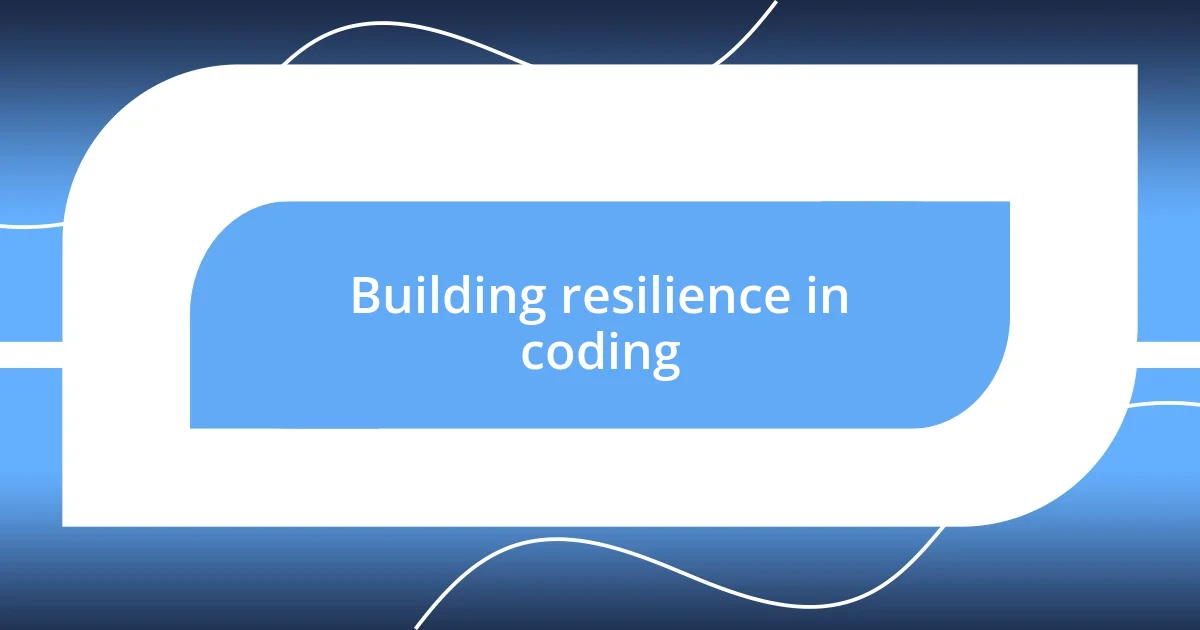
Building resilience in coding
Building resilience in coding requires a mindset shift towards viewing failures not just as setbacks but as crucial stepping stones. I vividly remember a time I faced a massive setback when a major feature I was developing crashed unexpectedly. The moment felt like the world was closing in. However, reflecting on that experience taught me that persistence in untangling the issues was essential. It ignited a determination in me to tackle problems directly rather than avoiding them. Can you recall a moment when facing a tough challenge turned into a defining experience?
Resilience also thrives in the way we approach feedback. I struggled initially with constructive criticism, often bristling at the first sign of it. Yet one day, after receiving a painful but honest review from a peer, I realized that this was an opportunity to grow, not an indictment of my abilities. That shift in perspective transformed my work ethic. Now, I’m not just eager for feedback; I actively seek it out. Isn’t it remarkable how opening ourselves to criticism can buffer against the sting of failure?
Lastly, I’ve gained a profound appreciation for the power of community within the coding world. There was a point where I felt utterly isolated, believing I had to tackle every problem alone. Joining a coding group changed everything. Sharing vulnerabilities and obstacles with others made me realize that every coder faces struggles. The stories were often similar, and together, we celebrated small victories. Have you ever found strength in a collective experience? This bond nurtures resilience, reminding me that each challenge becomes a shared journey, making us all stronger in our craft.
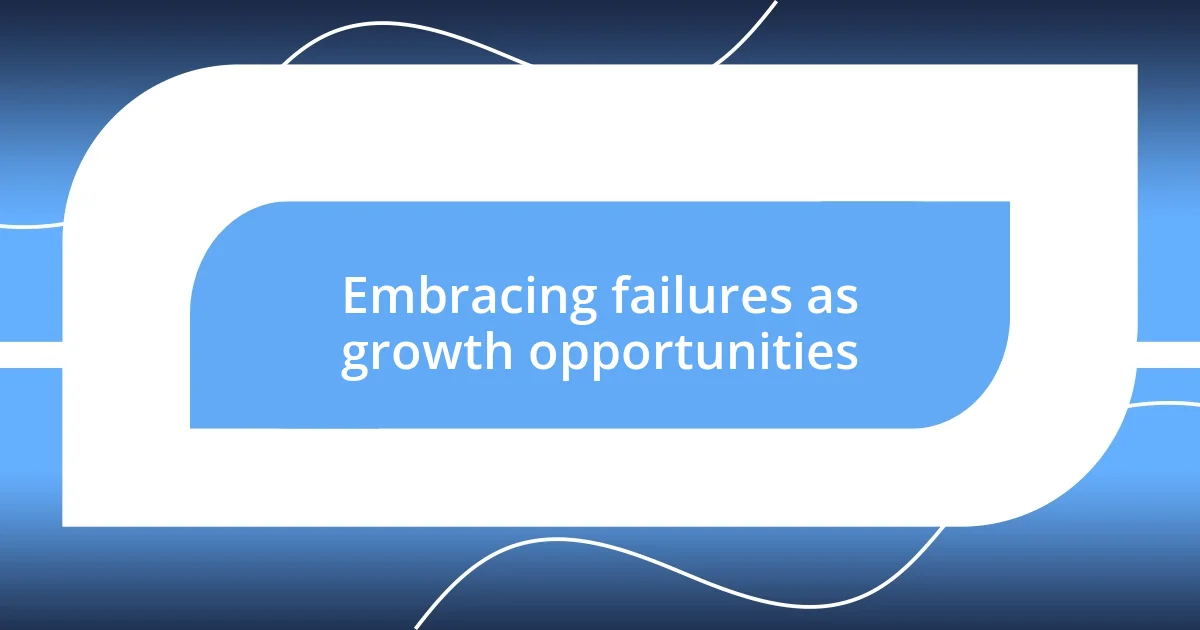
Embracing failures as growth opportunities
Embracing failures as growth opportunities has become a cornerstone of my coding journey. I recall a project where I mismanaged unexpected bugs, leading to delays that frustrated my team. Instead of letting that moment paralyze me, I chose to reflect on what went wrong. This introspection was uncomfortable, but it unearthed lessons about proper testing and time management that I now carry forward. Have you ever turned a troublesome moment into a learning experience that ultimately shaped your approach?
The emotional rollercoaster that follows a coding failure can be daunting, yet it’s also where the magic happens. After encountering a major glitch during a deployment, I felt a wave of inadequacy wash over me. But instead of sulking, I channeled that frustration into curiosity, dissecting the problem piece by piece. It was through tackling this setback that I discovered new tools and strategies. Isn’t it interesting how our most challenging moments often lead to unexpected growth?
I’ve found that sharing these experiences with fellow coders not only alleviates the burden but also enriches our collective knowledge. One afternoon, while discussing failures at a local coding meetup, I heard a colleague recount her own blunders with humor. We laughed together, and in that moment, the weight of my own mistakes felt lighter. This openness fosters an environment where we can all grow from each other’s missteps. Have you ever participated in a discussion where vulnerability became a catalyst for growth among peers? That sense of community is an invaluable aspect of embracing failure as a stepping stone in our coding careers.












